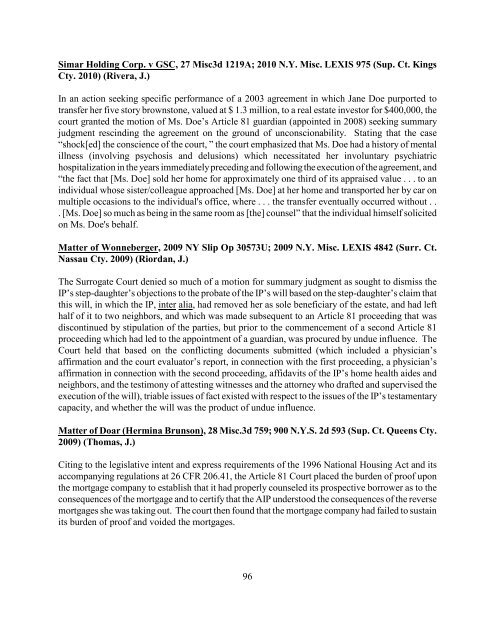MHL ARTICLE 81 - New York State Unified Court System
MHL ARTICLE 81 - New York State Unified Court System
MHL ARTICLE 81 - New York State Unified Court System
You also want an ePaper? Increase the reach of your titles
YUMPU automatically turns print PDFs into web optimized ePapers that Google loves.
Simar Holding Corp. v GSC, 27 Misc3d 1219A; 2010 N.Y. Misc. LEXIS 975 (Sup. Ct. Kings<br />
Cty. 2010) (Rivera, J.)<br />
In an action seeking specific performance of a 2003 agreement in which Jane Doe purported to<br />
transfer her five story brownstone, valued at $ 1.3 million, to a real estate investor for $400,000, the<br />
court granted the motion of Ms. Doe’s Article <strong>81</strong> guardian (appointed in 2008) seeking summary<br />
judgment rescinding the agreement on the ground of unconscionability. Stating that the case<br />
“shock[ed] the conscience of the court, ” the court emphasized that Ms. Doe had a history of mental<br />
illness (involving psychosis and delusions) which necessitated her involuntary psychiatric<br />
hospitalization in the years immediately preceding and following the execution of the agreement, and<br />
“the fact that [Ms. Doe] sold her home for approximately one third of its appraised value . . . to an<br />
individual whose sister/colleague approached [Ms. Doe] at her home and transported her by car on<br />
multiple occasions to the individual's office, where . . . the transfer eventually occurred without . .<br />
. [Ms. Doe] so much as being in the same room as [the] counsel” that the individual himself solicited<br />
on Ms. Doe's behalf.<br />
Matter of Wonneberger, 2009 NY Slip Op 30573U; 2009 N.Y. Misc. LEXIS 4842 (Surr. Ct.<br />
Nassau Cty. 2009) (Riordan, J.)<br />
The Surrogate <strong>Court</strong> denied so much of a motion for summary judgment as sought to dismiss the<br />
IP’s step-daughter’s objections to the probate of the IP’s will based on the step-daughter’s claim that<br />
this will, in which the IP, inter alia, had removed her as sole beneficiary of the estate, and had left<br />
half of it to two neighbors, and which was made subsequent to an Article <strong>81</strong> proceeding that was<br />
discontinued by stipulation of the parties, but prior to the commencement of a second Article <strong>81</strong><br />
proceeding which had led to the appointment of a guardian, was procured by undue influence. The<br />
<strong>Court</strong> held that based on the conflicting documents submitted (which included a physician’s<br />
affirmation and the court evaluator’s report, in connection with the first proceeding, a physician’s<br />
affirmation in connection with the second proceeding, affidavits of the IP’s home health aides and<br />
neighbors, and the testimony of attesting witnesses and the attorney who drafted and supervised the<br />
execution of the will), triable issues of fact existed with respect to the issues of the IP’s testamentary<br />
capacity, and whether the will was the product of undue influence.<br />
Matter of Doar (Hermina Brunson), 28 Misc.3d 759; 900 N.Y.S. 2d 593 (Sup. Ct. Queens Cty.<br />
2009) (Thomas, J.)<br />
Citing to the legislative intent and express requirements of the 1996 National Housing Act and its<br />
accompanying regulations at 26 CFR 206.41, the Article <strong>81</strong> <strong>Court</strong> placed the burden of proof upon<br />
the mortgage company to establish that it had properly counseled its prospective borrower as to the<br />
consequences of the mortgage and to certify that the AIP understood the consequences of the reverse<br />
mortgages she was taking out. The court then found that the mortgage company had failed to sustain<br />
its burden of proof and voided the mortgages.<br />
96

















